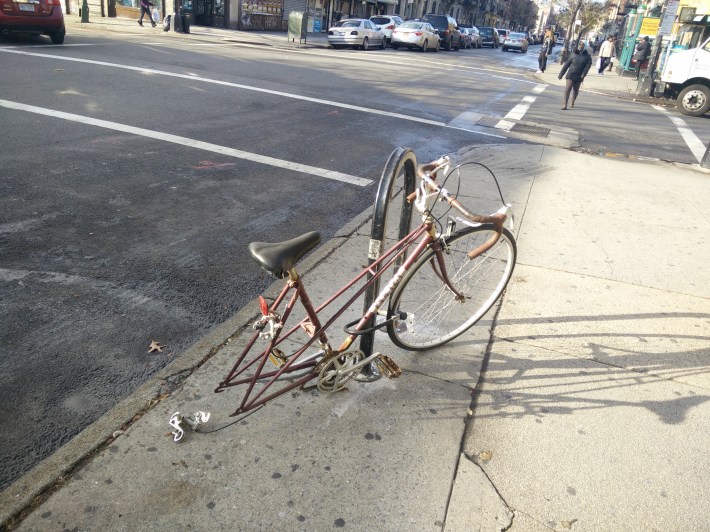The city's process for removing abandoned bikes from public property is broken, advocates say, but a bill proposed by Council Member Brad Lander to deal with the problem needs some adjustments in order to be effective.

Abandoned bikes on the sidewalk are an eyesore and make it harder for people using their bikes to find an open spot to lock up. Since 2010, the Department of Sanitation has had the authority to remove “derelict” bikes, but the conditions required for a removal still leave too many abandoned bikes cluttering the street.
The city's rules currently state that a bike is derelict if it is attached to public property and meets at least three of the following criteria:
- It is “crushed or not usable”
- It's missing parts
- It has flat or missing tires
- It has damaged handlebars or pedal, or is at least 75 percent rusted
So, if a bike has flat tires and bent wheels and hasn't been moved from a rack for months, DSNY won't remove it. The bike has to be in worse shape, and even then the department probably won't do anything unless someone complains to 311. There is no proactive process for abandoned bike removal.
Testifying before the City Council transportation committee yesterday, DSNY Director of Cleaning and Collection Steven Costas said that two-thirds of the derelict bikes removed by the department this year were in four community districts in Manhattan and Brooklyn. In the past two years, DSNY has impounded over 2,400 derelict bikes, according to 311 data made public by the city. But those stats don't measure how many abandoned bikes are left in place.
Lander's bill, Intro 787, authorizes a new protocol, in which DSNY would tag bicycles that look abandoned and bike owners would have 36 hours to remove the tag before DSNY impounds the bike. To get a bike back, owners would have to pay a fine between $25 and $100 or appeal to the Environmental Control Board.
Costas said that DSNY opposes the proposal as it is written because the agency lacks the personnel and storage space to tag, monitor, and collect the bikes.
Transportation Alternatives said it supported the spirit of the proposal, but that the bill doesn't address the core problem -- DSNY's failure to act on its authority to clear abandoned bikes. "We believe the reason for bikes not being removed is in large part due to the extremely high degree of disrepair a bike must show before the Department of Sanitation will remove it," said TA director Paul Steely White.
Lander said at the hearing that his bill is a work in progress and committed to working with DSNY and others to "amend the bill and the system so we can address the abandoned bike issues."
Speaking today over the phone, Lander said one aspect of the bill that's in line for revision is the complicated impoundment system and civil penalties. Once a bike is tagged by DSNY, he said, owners should have a longer period than 36 hours -- weeks or perhaps months -- to claim their bike and remove the tag. But once that period has passed, the bike would not be recoverable. This could make the administration of the program more feasible for DSNY while giving bike owners a more reasonable period of time to claim a bike they leave in one place.
Instead of impounding the bikes, Lander said, “My hope would be that they can be donated."
Residents who want to report a derelict bike can do so by filing a report online with 311.





